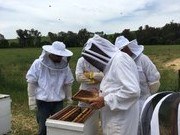
Practical Beekeeping in Tarcutta
Diversity of plants means better food for pollinators
Mike James from Wagga Wagga Amateur beekeeping group hosted the second part of our two-part practical beekeeping workshop series. 22 people gathered at Jenny and Rob Ellis’ place near Tarcutta on Sunday 20th November to learn about the practical side of beekeeping. Sitting under the shade of a tree we learnt all about bees, the logistics of keeping them and the risks associated. Some would think the risks are obvious…..being stung. But no, being stung, as Mike puts it, is very much avoidable with the proper use of a smoker and a pair of good gloves. Spread of disease and lack of hygiene, it turns out, is the biggest risk when considering keeping bees. So if you’re thinking of taking up the hobby be sure to contact your local beekeeping club who can help you to understand disease prevention and provide handy hits to combat lack of hive hygiene. One hot tip I learnt was that if you’re bees are being untidy, placing a banana skin in the box releases a pheromone that encourages bees to be more cleanly – who would have thought!
After a delicious lunch, we all donned a veil and took a sneak peek inside a real-live bee box. It was here, holding a frame of brood (for those not in attendance – brood are baby bees) enveloped by smoke billowing from the smoker, that we really understood the incredible life of a honeybee…and just how much there is to learn about these wonderful pollinators.
WHAT CAN YOU DO?
If you think bees just aren’t for you but you’d like to help protect both exotic and native pollinators from decline, there is a way that you can help. By planting a diverse range of trees, shrubs and grasses in your garden or paddocks. By doing this, you will supply pollinators with a wealth of nectar and pollen year-round.




